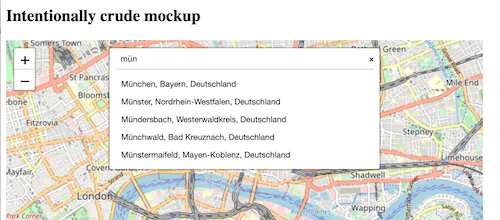Hi everyone,
if you are a regular listener of the Geomob podcast*, you will know from the occasional update episodes that I do with co-host Steven Feldman that we are hard at work on a new “Geosearch” service. I discuss it in some detail in Episode 74 which was released today, and also in Episode 68 from a few weeks ago.
This may lead to the natural question …
What is geosearch?
and isn’t that what OpenCage already offers?
We currently offer a forward and reverse geocoding API. In forward geocoding you send an address or placename to our API and we return the corresponding coordinates and other information about that location. Geocoding is usually a backend process, for example you might run a script to geocode your database of customer addresses.
In contrast, with geosearch you send us a partial text string and we return the most likely locations that match that string. The best example of geosearch is - as the name suggests - a search box on a map, where users are entering free text.
We recently wrote a more detailed guide, where we go into more detail about the difference between geocoding and geosearch and a few other geotechnologies like browser geolocation and IP geolocation that we are often asked about.
We are currently in the process of building a geosearch service. Many customers have asked us about it, and not infrequently we see customers try to use our forward geocoding API to accomplish this task, which doesn’t really work at all, the same way trying to use a screwdriver as a hammer doesn’t really work.
We need your help
We are very close to the stage of development where we need some external testers.

If you would like to help us test early versions of the service, or just generally have any opinions about what your ideal geosearch service should do, please get in touch.
You might now be saying “Ed, seriously, how hard can a search box be?”, but when you consider the edge cases of different scripts, a global dataset, places with different names in different languages, the need for simple to understand documentation, flexibility for a wide spectrum of software developers and use cases, and - not least - a clear pricing model, it quickly becomes a bit more complicated.
In the coming weeks we will be alpha testing, and then over the course of the summer we hope to launch a beta product, perhaps limited to certain regions of the world, before finally fully launching in the early autumn. So now is the time to get in touch if you have ideas of how this service should evolve.
Many thanks for your help, we look forward to hearing from you,
* If you are not yet a regular listener of the Geomob podcast you really should be.